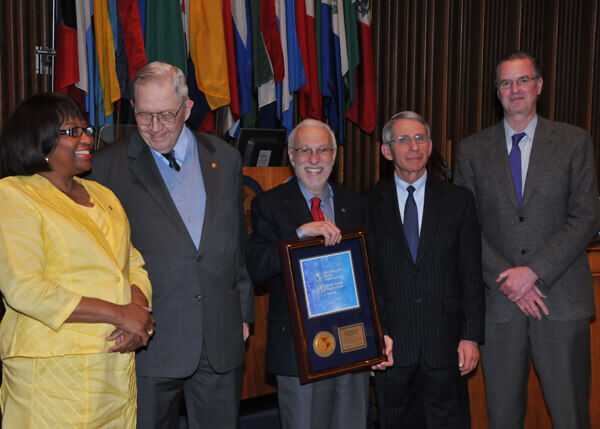Michael W. MarineSabin Vaccine Institute
Michael W. Marine is CEO of the Sabin Vaccine Institute, a nonprofit dedicated to advancing vaccine research and development.
In this guest post, Ambassador Michael W. Marine, CEO of the Sabin Vaccine Institute, writes about his organization’s 20th Anniversary Scientific Symposium event.
In a fitting way to kick off World Immunization Week, several hundred people gathered Friday, April 25th to celebrate significant achievements in vaccinology over the past two decades and to examine solutions for overcoming remaining hurdles at the Sabin Vaccine Institute’s (Sabin) 20th Anniversary Scientific Symposium. Hosted at the Pan American Health Organization (PAHO) in Washington, DC, it was an energized room filled with visionary leaders from humanitarian and health organizations, nongovernmental organizations, pharmaceutical companies, and academia.
Sabin’s President Dr. Peter Hotez opened the event by asking, “What do the next twenty years look like for product development and access to vaccine and medicines? What is the outlook for meeting ambitious global health objectives?”
PAHO Director Dr. Carissa Etienne then highlighted the remarkable successes in the Americas for the past 20 years. By this March, “17 countries and territories … had added the rotavirus vaccine to their vaccination schedules, 28 had (introduced) the pneumococcal vaccine and 20 the [HPV] vaccine.” Country ownership is nearly complete, with “more than 95 percent of vaccines purchased with national funds.” Still, PAHO Member States are working to ensure that municipal vaccination coverage reaches 95 percent or higher everywhere.

Dr. Ciro de Quadros, Sabin’s executive vice president, explained how Sabin “is guided by an unwavering belief: Lasting health solutions that benefit every person in a country can only truly be achieved when that nation supports health interventions out of its own budget; builds technical expertise; and maps its health priorities.” He added that in addition to quickening the pace of country and regional adoption of the Global Vaccine Action Plan (GVAP), “integration and cooperation are areas (where) we could all do better.”
Via videoconference, Dr. Julio Frenk, dean of the Harvard School of Public Health, shared reflections on the evolution of global health and vaccination. He urged partners to consider how resources could be allocated more efficiently, prioritizing spending where there is the greatest need and where it will have the greatest impact.
Dr. Seth Berkley, CEO of GAVI, explained its co-financing model, which “is about building ownership, building sustainability, and ensuring advocacy.” GAVI has notably “immunized 440,000,000 additional children and averted 6,000,000 future deaths.”
Addressing vaccine research technologies, Dr. Anthony Fauci, director of the National Institute of Allergy and Infectious Diseases (NIAID) at the National Institutes of Health stressed “the incomparable effects of vaccinology.” He shared some inadequacies of following natural immunity for diseases like HIV and influenza and how scientists are identifying new development techniques for vaccine-based solutions.
Adding to the day’s excitement, Sabin’s Dr. de Quadros received PAHO’s highest honor, the Public Health Heroes of the Americas award. On behalf of PAHO, Dr. Etienne stated, “No single person has done more to extend the benefits of immunization in the Americas” than Dr. de Quadros, whose “vision, scientific acumen, undaunted courage, and boundless energy” played a central role in smallpox and polio eradication in the Americas, and the creation of PAHO’s Revolving Fund. Dr. Etienne commented that Dr. de Quadros is a “force for good in the region and in the world;” we at Sabin who work with him each day couldn’t agree more.
Dr. de Quadros then chaired a panel focused on how organizations are advancing the GVAP:
Delivering a powerful video message, Dr. Margaret Chan, director-general of the World Health Organization, stated, “countries must lead... they deserve to have the first say about priorities.” Despite a need to streamline and simplify programs, increase sustainable financing, and help people understand the value of vaccines, “the future of immunization looks bright.”
This was truly a memorable event, and we hope that through continued collaboration and the commitment of our diverse partners, collectively, we can realize lasting improvements. As Morton Hyman, Sabin’s chairman, closed the symposium, he tasked us with asking ourselves, “how we can do better, how we can challenge the status quo and look at smarter, more collaborative, more efficient models to deliver the gift of good health to all people.”
With 20 years of achievements behind us, Sabin looks forward to many years ahead filled with more success in reducing needless human suffering.